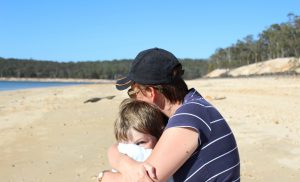 Tina Sheers is a married mother of four living in Victoria, Australia. This week she shared some of her personal experiences as an individual on the spectrum as well as advocacy tips for parents.
Tina Sheers is a married mother of four living in Victoria, Australia. This week she shared some of her personal experiences as an individual on the spectrum as well as advocacy tips for parents.
What does a typical day look like for you?
Mostly being at home in my safe place. I do love to go for long walks. We have two puppies that we take out, usually to my favorite place, which is walking around a lake. There used to be an old town under the lake (they made a weir wall.) The water is used for irrigation, and when it gradually goes down, I find little treasures of pieces of pottery, glass, and metal that I use to make art pieces with. My husband and I both homeschool one of our kids during the day. My husband drives our youngest to the local school, and he mainly handles all of the school things.
What are some of your passions and interests?
I adore anything that involves History. I love novels, movies, documentaries, etc. that are centered back in time.
Does it help for autistic people to meet/engage with others on the spectrum? Should parents pursue this opportunity for their children? Why or why not?
It does help me to interact with like-minded people. I personally do not choose or suggest my autistic kids friends for them, Autistic people are just like any other people with different personalities that can clash with others no matter what their neurology.
How has the pressure to “hide” autism affected you?
It’s not so much ‘hiding,’ it’s more behaving in a way that is not natural. So I am forced to act and behave in a way that I assume other people do. This is a learned behaviour, which I still can fail at. Acting this way all day with others can be so tiring and can lead to sensory overload. It takes up so much energy to remember all the social things and to remember in advance of what to do in certain situations. It is so much easier for me to walk around not giving eye contact, blocking out bright lights, ignoring voices and sounds. But in reality, as a adult in society, that is not possible.
Fill in the blank: It would be a lot easier on me if neurotypicals understood______________.
that I am not neurotypical. Therefore I will act autistic, and that’s okay.
What mistakes do neurotypical autism advocates make?
They attempt to explain autism without a lived experience of being autistic.
What kinds of blogs, books, or other resources would you recommend for parents of children on the spectrum?
https://musingsofanaspie.com/ is one of my favourites, it explains in simple terms many issues that I face.
I’m a big fan of social stories, I’d love it if they made these for adults! I find often that people may just assume you understand what to do in a situation, but, in reality, you have no idea.
